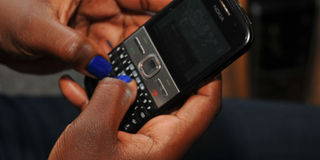How government has controlled communication during polls

On February 18, 2011, UCC ordered telecom service providers to block text messages to DEMGroup. FILE PHOTO
On February 18, only two hours after the polls had opened, social media sites such as WhatsApp, Twitter and Facebook were blocked.
Only earlier, in the wee hours of election day, mobile money services were also blocked.
Immediately after the shutdown, MTN sent a message to its subscribers indicating that they had been ordered to switch off their services by the Uganda Communications Commissions (UCC), the communications regulator.
“MTN has been directed by UCC to disable all social media and mobile money services due to a threat to public order and safety,” the message read.
UCC executive director Godfrey Mutabazi later confirmed to the media in Kampala that they had ordered the shutdown.
While there were allegations that the Electoral Commission (EC) had a hand in the shutdown, EC spokesperson Jotham Taremwa denied the claims. “We have not asked UCC to close down the social media,” he said.
Previous experiences
The shutting down of social media on February 18 was not the first time communication was being blocked on election day.
A day after the February 23, 2006, general election, government ordered and jammed the website of Monitor newspaper as well as the signals of its sister radio station, 93.3 K-FM in Kampala.
The reason given for closing the radio station was relaying election results live from the Namuwongo studio. At the time, the presidential results indicated a slim margin between FDC’s Kizza Besigye and NRM’s Yoweri Museveni who was in an early lead.
Other candidates in the race were Ssebana Kizito of the Democratic Party, Miria Kalule Obote of the Uganda Peoples Congress and Abed Bwanika of People’s Development Party.
After fours of shutdown, the website and radio signals were freed with the intervention of Dr Ruhakana Rugunda, who was then minister of Internal Affairs.
Earlier that day, while speaking to Conrad Nkutu, then Monitor Publications Limited managing director on phone, Rugunda admitted that the website as well as K-FM’s signals had been jammed.
But James Nsaba-Buturo, then minister of Information and Broadcasting, had denied any government involvement, Daily Monitor of February 27, 2006 reported.
During the 2011 elections UCC, again jammed communication systems of various institutions.
On February 18, 2011, the election day, UCC ordered telecommunication service providers in the country to block text messages, also known as short messages, that were wired to the Democracy Monitoring Group (DEMGroup), a civil society consortium funded by the European countries to promote freedom and democracy.
Airtel, Orange and Warid telecommunications service providers blocked text messages relaying election related reports to the DEMGroup tally Centre at Muyenga, a Kampala suburb.
Nevertheless, MTN the largest telecommunications service provider defied the UCC order, citing interrupting their subscribers’ communications as well as loss of revenue.
Only 48 hours to the hotly contested presidential election between Museveni and Besigye, his former doctor during the Bush War, UCC issued what they called guidelines to telecommunications service providers.
“Should the content of the message [SMS] be deemed to be controversial or advanced to incite the public, it will be blocked,” the directive read part.
The acting DEMGroup executive director John Mary Odoy, speaking to the media in Kampala, condemned the act and said it was against the spirit of freedom and democracy.
But Uganda Telecommunication Limited (UTL) and Airtel, whom the media talked to, denied blocking SMS with election related messages sent to DEMGroup.
Also affected in a similar manner was the Inter Party Cooperation (IPC) whose communication line was blocked by UCC.
On the election day of February 18, 2011, UCC jammed the telephone line through which the IPC was receiving election results from its polling agents in the field.
IPC communications director Margaret Wokuri told the media in Kampala that they had planned to publish their final election results by February 19, 2011, but UCC intercepted their polls results by jamming their communications.
Then UCC interim executive director Godfrey Mutabazi denied UCC was responsible for blocking the IPC “tally” telephone line.
Unlike the previous general elections when SMS and websites of institutions were jammed, this time the general public was equally affected with the blocking of mobile money




